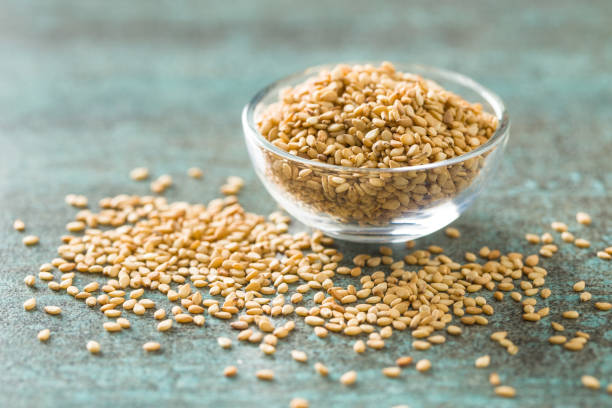Unlocking the “Superseed”: Why Sesame is a Golden Opportunity for African Exporters and a Nutritional Powerhouse for the Diaspora

Sesame seeds, those tiny, unassuming powerhouses, are rapidly gaining global recognition not just as a culinary delight, but as a “superseed” packed with incredible health benefits. For African nations, particularly those like Nigeria which ranks among the world’s top producers, this growing demand presents a golden opportunity for economic growth and significant profits for exporters. And for the African diaspora, it’s a chance to connect with a nutritious food deeply rooted in their heritage.
The Nutritional Bounty of Sesame Seeds: A Win for Wellness
Sesame seeds are a nutritional marvel, offering a wide array of benefits that cater to increasingly health-conscious consumers worldwide, including those in the diaspora seeking wholesome options.
- Rich in Essential Nutrients: These tiny seeds are a fantastic source of protein, fiber, healthy fats, and a host of vital vitamins and minerals. They contain zinc, selenium, copper, iron, vitamin B6, vitamin E, calcium, magnesium, and manganese.
- Immune System Support: The presence of zinc, selenium, copper, iron, and B vitamins makes sesame seeds excellent for bolstering the immune system, helping the body fight off infections.
- Heart Health Hero: Sesame seeds are rich in lignans and phytosterols, compounds known to help lower cholesterol levels. Their polyunsaturated fatty acids also contribute to cardiovascular health.
- Antioxidant Powerhouse: Packed with antioxidants like sesamin and sesamol, sesame seeds combat free radicals in the body, protecting cells from damage and potentially reducing the risk of chronic diseases, including certain cancers.
- Bone Strength and More: The significant calcium, magnesium, manganese, and zinc content contributes to strong, healthy bones, helping prevent conditions like osteoporosis. Furthermore, they are beneficial for digestive health due to their high fiber content, and the zinc in sesame seeds supports healthy skin and hair. Some studies even suggest benefits for blood sugar control, oral health, and reducing inflammation.
Economic Gold: Profits for African Exporters
The global demand for sesame seeds is on a steady rise, making it a highly profitable agricultural commodity for African nations.
- High-Value Crop: Sesame is considered a high-value crop that generates significant revenue for producing countries. For example, Nigeria generated an estimated $700 million from sesame exports in 2024.
- Poverty Alleviation: In countries like Nigeria, where sesame cultivation is concentrated in regions facing economic challenges, the industry provides crucial income and livelihoods for millions of smallholder farmers, playing a key role in poverty reduction.
- Foreign Exchange Earner: Sesame exports contribute substantially to the foreign exchange earnings of African economies. It’s often one of the top non-oil agricultural exports, boosting national economies and improving trade balances.
- Untapped Potential: Many African countries, including Nigeria, have significant untapped potential in sesame export, indicating room for even greater growth and profitability. Investments in infrastructure, technology, and access to credit can further enhance this potential.
- Versatile Market: Sesame seeds are used across various industries – food (oil, confectioneries, baking), cosmetics (soaps, creams, perfumes), pharmaceuticals, and animal feed. This diverse demand ensures a robust market for African exporters.
- Climate Resilience: The drought-resistant nature of the sesame plant makes it a resilient crop in many African regions, offering a reliable source of income even in challenging climatic conditions.
Connecting with Heritage: Benefits for Diaspora Consumers
For the African diaspora, sesame seeds offer more than just nutritional advantages; they provide a tangible link to their cultural heritage and culinary traditions.
- Culinary Versatility: From tahini and hummus to traditional African stews and snacks, sesame seeds are a staple in many cuisines. Diaspora consumers can easily incorporate these seeds into their daily diets, reconnecting with ancestral flavors and recipes.
- Wholesome and Authentic: As consumers increasingly seek natural and minimally processed foods, African-sourced sesame seeds offer a wholesome and authentic ingredient that resonates with a desire for clean eating.
- Supporting African Economies: By purchasing sesame seeds exported from African nations, diaspora consumers directly contribute to the economic development of their ancestral lands, fostering a sense of community and shared prosperity.
- Health and Wellness Alignment: The myriad health benefits of sesame seeds align perfectly with the growing emphasis on wellness within diaspora communities, offering a culturally relevant and nutritious addition to their diets.
Conclusion
In conclusion, sesame seeds are more than just a culinary ingredient; they are a symbol of economic opportunity and a beacon of health. For African exporters, embracing and scaling up the sesame industry promises significant profits and sustainable development. And for the African diaspora, it’s an invitation to savor a nutritious superfood that nourishes both body and soul, while supporting the vibrant economies of their homeland. The tiny sesame seed truly holds immense power to connect continents and empower communities.




